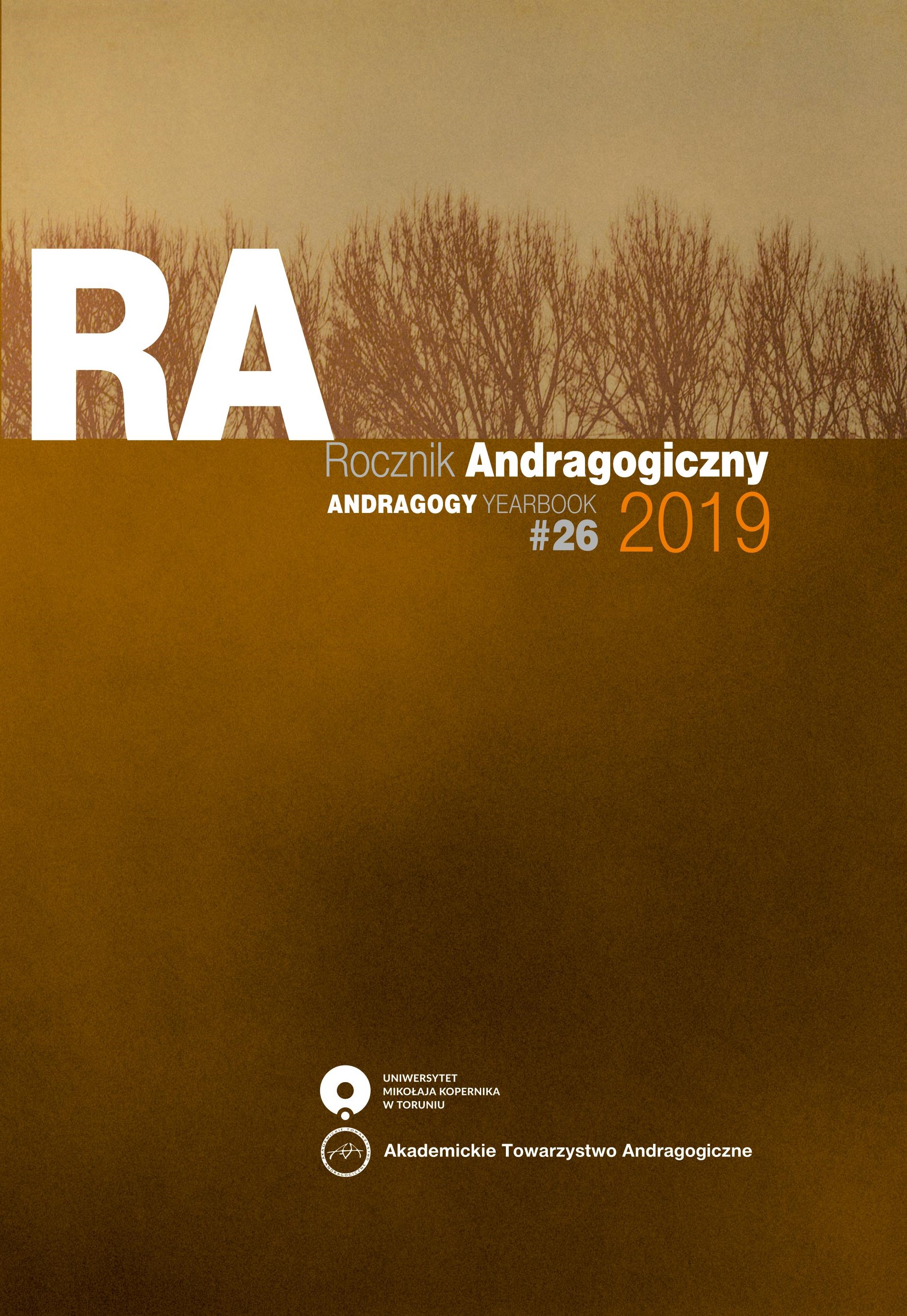Local center of knowledge and education – the center of initiating and organizing non-formal education for adults in local communities
DOI:
https://doi.org/10.12775/RA.2019.012Keywords
lifelong learning, adult education, non-formal education, Local Center of Knowledge and education, local communityAbstract
The aim of the article is to present the idea of establishing Local Centers of Knowledge and education in Poland which are the centers for initiating and organizing non-formal education for adults in their nearest environment. This initiative is undertaken by the Ministry of National education as a part of the implementation of the program for the promotion of an adult education in Poland and increasing the access of adults to various forms of lifelong learning, with particular emphasis on people with low levels of key competences and/or not participating in organized forms of education. The article presents assumptions, goals, and stages of the pilot project entitled “Academy of Necessary Knowledge – a new face of the school as a Local Center of Knowledge and education” implemented by Wroclaw University of Science and Technology and funded by the european Union and country budget as a part of the Operational Programme Knowledge education Development. As a result of the project, 20 Local Centers of Knowledge and education in seven voivodships in Poland were established. During the period of a six months the model based on main assumptions of andragogy and psychology of adult development was tested. The solutions that had the highest impact on adults’ activation were: flexible educational offer based on the diagnosis of adults needs, education taking into account the specifics of adults learning, proximity to the place of residence, schools’ resources and infrastructure use, cooperation with institutions from the environment of school, integration of the local community. The solutions of the model that did not work well during the testing phase were: focus on the development of professional competences, duties of the staff (ie. conducting classes for adults), accompanying in developmental change. The evaluation of the project was the basis to modification of the Local Centres of Knowledge and education model. The conclusions from the evaluation of this project, and two others carried out at the same time, will be the basis for further competitions aimed at launching next Local Centres of Knowledge and education in the country.References
Burski J., Chłoń-Domińczak A., Palczyńska M., Rynko M., Śpiewanowski P. (2013), Umiejętności Polaków – wyniki Międzynarodowego Badania Kompetencji Osób Dorosłych (PIAAC) – Raport, Instytut Badań edukacyjnych, Warszawa.
Dobrzyńska M., Worek B. (2019), (Nie)uczące się społeczeństwo? Wyzwania pomiaru aktywności edukacyjnej dorosłych Polaków, http://ec.europa.eu/epale/pl (dostęp: 2.07.2019).
Eurostat, http://appsso.eurostat.ec.europa.eu/nui/submitViewTableAction.do (dostęp: 15.05.2019).
Góralska R., Leek J. (2017), Empowerment in the Lifelong Learning Perspective. Example from the „ICT Guides” Project, „Rocznik Andragogiczny”,24, s. 269–283.
Jurgiel-Aleksander A. (2015), Jaka edukacja i dla kogo? Biografie edukacyjne dorosłych i ich społeczny wymiar, „Rocznik Andragogiczny”, 22, s. 79–100.
Kurantowicz E. (2007), O uczących się społecznościach. Wybrane praktyki edukacyjne ludzi dorosłych, Wydawnictwo Naukowe Dolnośląskiej Szkoły Wyższej edukacji TWP, Wrocław.
Malewski M. (2010), Od nauczania do uczenia się. O paradygmatycznej zmianie w andragogice, Wydawnictwo Naukowe Dolnośląskiej Szkoły Wyższej, Wrocław.
Mazurek E., Kuzilek-Sekścińska E., Suchożebrska E., Stępień T. (2018), Model Lokalnego Ośrodka Wiedzy i Edukacji „Akademia Wiedzy Koniecznej”, WIPRA, Wrocław.
Mazurek E., Stępień T. (2019), Potrzeby aktywności edukacyjnej i rozwoju kompetencji kluczowych osób dorosłych. edukacja Ustawiczna Dorosłych, nr 3(106), s. 62–77. DOI: 10.34866/wwyj-gv50.
Ministerstwo edukacji Narodowej, serwis Programu Operacyjnego Wiedza edukacja Rozwój, https://efs.men.gov.pl/ogloszenia-nabory/zwiekszenie-dostepu-osob-doroslych-do-roznych-form-uczenia-sie-przez-cale-zycie-poprzez-przygotowanie-szkol-do-pelnienia-roli-lokalnych-osrodkow-wiedzy-i-edukacji/ (dostęp: 2017–2019).
Politechnika Wrocławska, Studium Nauk Humanistycznych i Społecznych, http://snhis. pwr.edu.pl/projekty/projekt-awk-nowe-oblicze-szkoly-jako-lowe (dostęp: 2017–2019).
Stopińska-Pająk A. (2015), Polskie tradycje instytucji edukacji dorosłych w kontekście uczenia się całożyciowego, „Rocznik Andragogiczny”, t. 22, s. 289–300.
Downloads
Published
How to Cite
Issue
Section
Stats
Number of views and downloads: 663
Number of citations: 0



